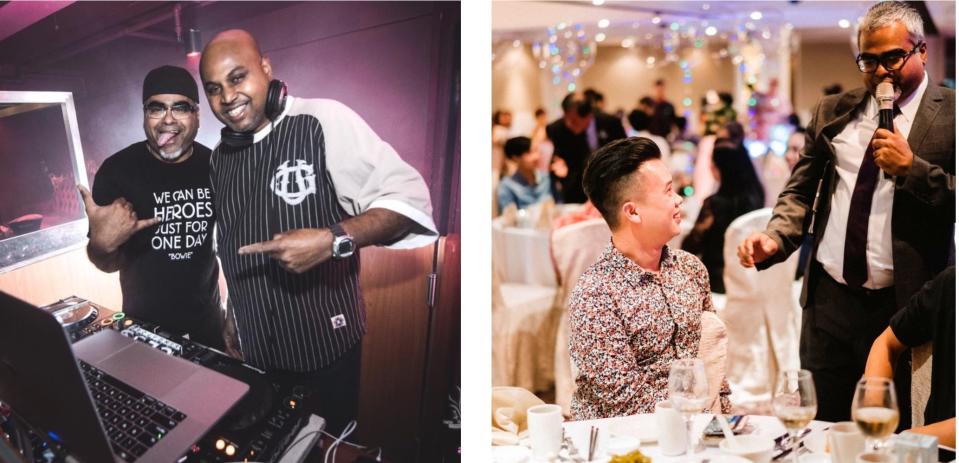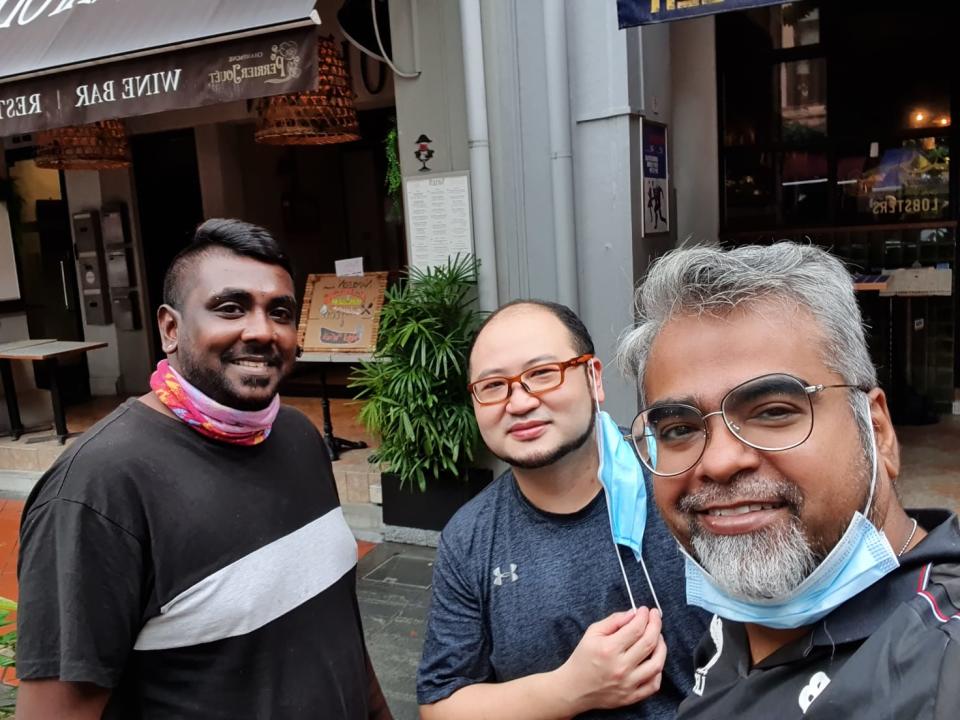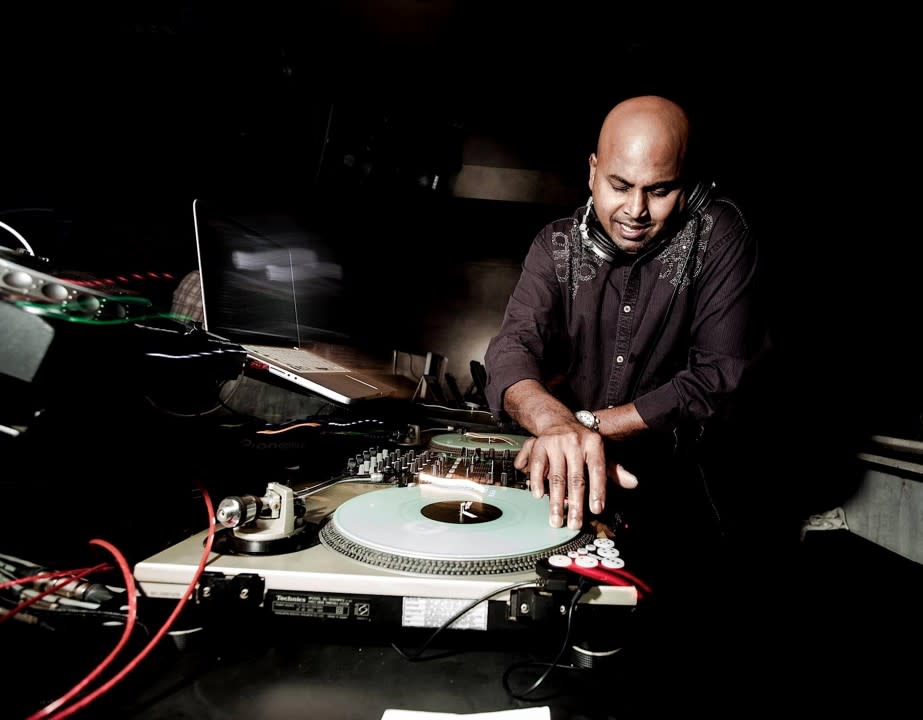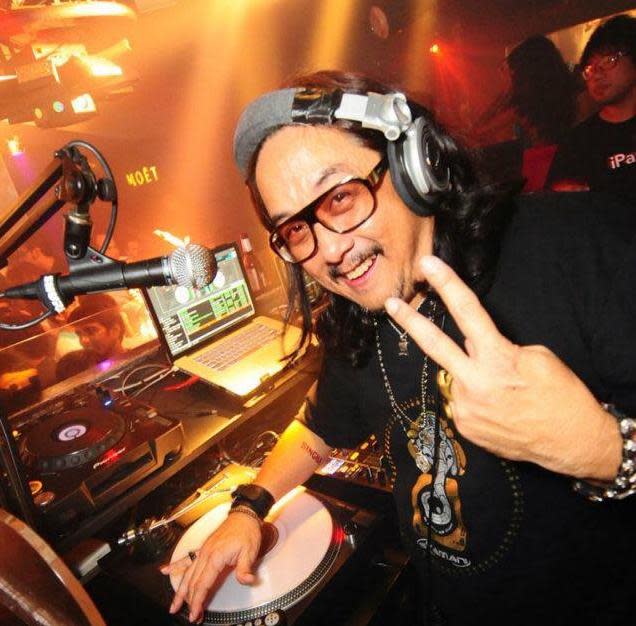COVID Career Change: Nightlife vets dance to a new beat

Years from now, the history of the 21st century will be divided into two eras: before COVID-19, and after COVID-19. But as the pandemic continues to wreak havoc on the global economy, Singaporeans are not standing still. From adapting to new regulations to finding entirely new trades, they are innovating and finding new ways to make a living. In the first of this short series, Yahoo News Singapore speaks to three stalwarts of the nightlife industry who have found new meaning and purpose.
From deejaying to delivery

Life was good before COVID – deejay and emcee Victor Shaqur, 48, was earning close to a five-figure sum every month.
On weekdays, the 30-year nightlife veteran was doing gigs at well-known clubs like Attica. Every other weekend, he also emceed events like weddings and IT shows, at an average of $800 a pop. The biggest event he ever deejayed at: a Nanyang Technological University event in the early 1990s, with around 25,000 people and then-Prime Minister Goh Chok Tong in attendance.
Shaqur previously had a residency at Shanghai Dolly, which drew up to 500 people every night at its peak and closed in April 2018. He spoke fondly of the pre-show nerves and the adrenaline rush that followed each time he stepped on stage. “When you see hundreds and hundreds of people responding, it’s so fun. I really miss that.”
Then the pandemic arrived. The lack of income, coupled with bills to pay and little savings, led to Shaqur drastically altering his lifestyle and subsisting on instant noodles for a time. He also began doing food deliveries with his Honda Crossroad and helped out at a shop selling drinks, working up to 20 hours a day in order to make ends meet.
Still, it was left to Shaqur’s wife Anne, 30, a programme manager, to pay the lion’s share of the bills. “As a 48-year-old man, when your wife has to pay for things, you feel very one kind,” said the father of three.
But things only got worse. On 7 April, as Singapore entered a partial lockdown, many businesses were forced to cease operations. And while restaurants and eateries have since been allowed to resume business, nightclubs, discos and karaoke lounges remain shuttered.
It all took an emotional toll, though Shaqur knew that he was not the only one affected. “You feel like everybody has betrayed you. You feel like there is no longer loyalty in the industry, like everybody has turned their back on you, like you are left in a corner to rot by yourself.”

Then in April, Shaqur decided to strike out on his own, starting a food delivery service called Dropoff. It is a straightforward, albeit “primitive” platform: orders are taken via WhatsApp, which are then thrown to a group chat of riders.
He freely admitted that he was treading water at the deep end. “I was overwhelmed at one point, with too many jobs and not enough drivers. When it rains, when there is a traffic jam, people start calling you to ask ‘Where’s my food?’, it’s a bit of a nightmare. Understanding the delivery game was a massive thing for me.”
But Shaqur drew on the knowledge gleaned from a marketing course at SMU and began using software to plan out delivery routes. He also cultivated relationships with different restaurants. Starting with around eight riders servicing three restaurants, Dropoff has now grown to around 50 riders – many also from the nightlife industry – servicing about 40 restaurants and organisations. They include the Grand Park Group, Leckerbauer and Lady M.
Zoom meetings with lunch are now a popular option, creating a logistical nightmare for Shaqur and his riders. The last such order: 40 meals to arrive at the same time at 30 locations, which required dispatching 15 drivers, who had to pick up the food at different timings too.
Customers also appreciate the human touch, said Shaqur. “With the GrabFood app, there is no talking. But one restaurant owner told me, ‘The best thing about you guys is, whenever (there’s an) order, there is a human responding.’”
And while Shaqur now earns as little as a third of his previous income, he is happy. While he misses entertaining people, he does not miss the drinking aspect of the job – almost every other day, he would come home intoxicated.
“I like this whole work-from-home concept. I can see my family and cats all the time.”
Cooking up a new trade

Back in April, Titus Singam, 52, became one of the more than 57,000 COVID-19 patients in Singapore, albeit with mild symptoms. Upon being discharged three weeks later, he reached an epiphany, “Our industry is totally wiped out.”
Once upon a time, Singam performed as a deejay alongside artistes like Akon and Snoop Dogg, hobnobbing with the likes of Lil Jon and The Black Eyed Peas. An early pioneer in Singapore’s hip hop scene, the 30-year nightlife veteran has also worked at clubs such as KYO and Ce La Vi.
“Before COVID, I had a very steady income. We were really up to our necks doing this kind of stuff,” said Singam, who also ran a small events company called The DJ Institute. “It was year-end, things were piling up, and we had bookings for early this year.”
“But because of COVID, everything got cancelled.”
With a monthly income of five figures dropping to literally “zero”, some tough decisions had to be made by Singam and his wife Pamela, 40. Two full-time staff, as well as many part-timers, were let go.
It was then that the couple decided to start a new project: a home kitchen specialising in Sri Lankan-influenced cuisine called Tastebudz, drawing on Singam’s love of cooking. Its signature dish: tiger prawns cooked in a rich coconut gravy, a recipe created by Singam after a 2014 trip to the Sri Lankan city of Galle. Singam is also of Sri Lankan descent.

“I enjoy cooking. Everyone can do dishes like fried rice and mee goreng, but I like to tweak it and make it my own,” said Singam. Having tasted the prawn curry, this reporter can attest to its rich, bright flavours, which must be slowly savoured.
All the cooking is done in the couple’s condominium unit. From Tuesday to Friday, lunch and dinner orders are taken via Facebook DMs, and the food is delivered on the weekend. Sets range from $17 to $20, with a minimum of two sets per order. Many people come to pick up their orders, while the duo also deliver food personally.
Since July, when Tastebudz was first launched, weekly orders have now grown to about 80-100. “It’s not in vast quantities, so the quality is controlled. As the orders are piling up, we are going to outsource deliveries,” said Singam.
Working out the costings was a struggle at first, but he received “great help” from his brother-in-law, who is the head chef at NOX-Dine in the Dark. Singam does most of the cooking, while Pamela handles most of the commercial aspects such as accounts and marketing.
And while his monthly income is a far cry from before, Singam is grateful to be making ends meet. And he also has bigger plans in store. “My dream is to one day have an outlet where we can serve food, have it together with a bar, maybe get a DJ on weekends. It will put everything that I’m good at together.”
He added, “At the back of my mind, I did think that I have always wanted to do something like this. But the good thing about COVID is that it has pushed me across the boundary to do this. It’s looking good.”
The drunk and unmasked

When Yahoo News Singapore spoke to Clifford Chua, in his 50s, over the phone, he was in the middle of his part-time job: helping to enforce safe management measures at a beach bar in Sentosa.
Asked how it compares to dealing with drunken people in a club, Chua, who is the entertainment director at Attica, replied with a laugh, “It’s about the same.”
“I do public relations in my work as well. You need a good rapport with people, so if you know how to communicate with people, it’s easier to ask people to wear a mask in a nicer way.”
Another decades-long veteran of Singapore’s nightlife scene, Chua is on unpaid leave at the moment. Before COVID-19 hit, the father of one was in charge of everything from the deejays and dancers to the bottle service and themed nights. Attica drew crowds of 150-200 on the weekends, he said, and hosted high-profile deejays like Steve Aoki and Paul Harris.
“The clubbing industry depends a lot on tourists,” noted Chua. “65 per cent of my clientele are tourists, from Asia and all around the world. So, once COVID hit us, when they started locking down, we felt the effects.
“Everything was cancelled, so all the high-profile DJs that were coming in all got cancelled.”
The knock-on effects have been felt by everyone in the industry: deejays, bartenders, public relations staff, right down to the cleaners. And with the current prohibition on playing live music in bars and pubs, freelance musicians are also unable to make a living.
After one month of taking a wait-and-see approach – Attica shut in April – Chua and many others took up part-time jobs. For a few months, Chua delivered face masks, tapping on a friend in the pharmaceutical business. Chua has also done delivery jobs for Shaqur. “We are doing whatever we can do to survive. We are still waiting for news about whether we can open, but so far, the indication is not good.”
According to Chua, deejays earn between $350 and $1,500 for three to four hours of work, and a good one can make $6,000-$8,000 a month. “Now, we make $70-150 for a day’s work. With all this part-time work, some deejays can barely make $1,500. They have families to support, insurance and housing loans to pay. Some of them own cars as well.”
And while the current situation is “demoralising”, Chua is keeping a positive mindset. “We are not the only ones who are suffering. We just got to make do and do the best with whatever we can.”
He added, “We are just preparing plan C and plan D now. No one is certain what is going to happen.”
Stay in the know on-the-go: Join Yahoo Singapore's Telegram channel at http://t.me/YahooSingapore
Other Singapore stories:
MOM to review punishment framework for employers who illegally deploy foreign maids
One-off additional support for newborns to come: Heng Swee Keat
Parliament: Bill to help smaller firms undergoing insolvency via faster and cheaper way to be tabled
Singapore banks, finance companies to extend debt relief for individuals, SMEs
Parliament: Security features of new ERP units more superior to mobile phones – Amy Khor



